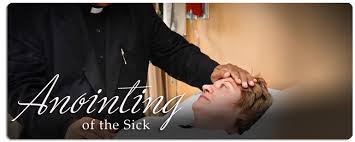If anyone in the parish is in need of celebrating the Sacrament of the Anointing of the Sick, they may contact the priest through the parish office. A priest can anoint someone after a Mass the parson may attend, come to the home of the person, or anoint a person in the priest's office.
In the case of an emergency, call the parish office at (717) 533-7168 or call the Hospital Emergency number at (717) 857-5695.
Usually in the month of October, a special Mass of Anointing is celebrated for all in need of anointing in the church. Watch the bulletin for details. Our Parish Nurse Ministry does contact all the people in the parish who are ill and invites them to this Mass and offers a means of transportation.
People should ask to be anointed before entering the hospital for surgery by one of our priests after Mass or in the office.
In the case of an emergency, call the parish office at (717) 533-7168 or call the Hospital Emergency number at (717) 857-5695.
Usually in the month of October, a special Mass of Anointing is celebrated for all in need of anointing in the church. Watch the bulletin for details. Our Parish Nurse Ministry does contact all the people in the parish who are ill and invites them to this Mass and offers a means of transportation.
People should ask to be anointed before entering the hospital for surgery by one of our priests after Mass or in the office.
What is the Anointing of the Sick?
The anointing of the sick is administered to bring spiritual and even physical strength during an illness, especially near the time of death. It is most likely one of the last sacraments one will receive. A sacrament is an outward sign established by Jesus Christ to confer inward grace. In more basic terms, it is a rite that is performed to convey God’s grace to the recipient, through the power of the Holy Spirit.
The anointing of the sick is administered to bring spiritual and even physical strength during an illness, especially near the time of death. It is most likely one of the last sacraments one will receive. A sacrament is an outward sign established by Jesus Christ to confer inward grace. In more basic terms, it is a rite that is performed to convey God’s grace to the recipient, through the power of the Holy Spirit.
The Sacraments Effects
"The special grace of the sacrament of the Anointing of the Sick has as its effects: the uniting of the sick person to the passion of Christ, for his own good and that of the whole Church; the strengthening, peace, and courage to endure in a Christian manner the sufferings of illness or old age; the forgiveness of sins, if the sick person was not able to obtain it through the sacrament of penance; the restoration of health, if it is conducive to the salvation of his soul; the preparation for passing over to eternal life" (CCC 1532).
Does a person have to be dying to receive this sacrament? No. The Catechism says, "The anointing of the sick is not a sacrament for those only who are at the point of death. Hence, as soon as anyone of the faithful begins to be in danger of death from sickness or old age, the fitting time for him to receive this sacrament has certainly already arrived" (CCC 1514).
"The special grace of the sacrament of the Anointing of the Sick has as its effects: the uniting of the sick person to the passion of Christ, for his own good and that of the whole Church; the strengthening, peace, and courage to endure in a Christian manner the sufferings of illness or old age; the forgiveness of sins, if the sick person was not able to obtain it through the sacrament of penance; the restoration of health, if it is conducive to the salvation of his soul; the preparation for passing over to eternal life" (CCC 1532).
Does a person have to be dying to receive this sacrament? No. The Catechism says, "The anointing of the sick is not a sacrament for those only who are at the point of death. Hence, as soon as anyone of the faithful begins to be in danger of death from sickness or old age, the fitting time for him to receive this sacrament has certainly already arrived" (CCC 1514).





